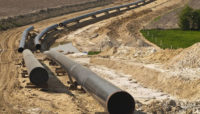In a 2-1 vote, the Federal Energy Regulatory Commission on Jan. 30 issued a declaratory order that the PennEast Pipeline Co. had a right to exercise eminent domain over state-owned land in New Jersey for its proposed nearly $1-billion, 116-mile natural gas pipeline project running from Pennsylvania to New Jersey.
The ruling may bolster PennEast's position when it petitions the U.S. Supreme Court to review the issue following unfavorable appellate court rulings last yea.
During the open commission meeting, FERC Chairman Neil Chatterjee cited the Natural Gas Act as the basis for the decision in PennEast's favor, saying that the "text, legislative history and precedent regarding [the law's] Section 7H all demonstrate Congress’ intent to delegate the authority to condemn state property to certificate holders.”
The order conflicts with a Sept. 10 ruling by the Philadelphia-based Court of Appeals for the Third Circuit, which said PennEast’s eminent domain approvals violated the Constitution's 11th Amendment, overturning earlier court decisions.
“The Third Circuit already held that a private pipeline company like PennEast lacks the authority to condemn state properties, and nothing about FERC’s action today changes that," said a spokesman for New Jersey's attorney general's office in an email to ENR. "Despite PennEast’s best efforts, the Third Circuit correctly sided with New Jersey’s interpretation of the Natural Gas Act and the Eleventh Amendment, and the court’s judgment remains in effect.”
Dissenting FERC Commissioner Richard Glick said “the majority is trying to use this petition for a declaratory order to try to influence PennEast’s effort" to get a Supreme Court review, adding, “In my opinion I don’t think we should be pushing out an order just to bolster a private party’s litigation position.”
PennEast plans to file a petition before the high court’s March 4 deadline, the company has said.
In a change to previous plans, the company also announced it intends to build the pipeline in two phases. In the first, a 68-mile, 36-in. pipe would be built in Pennsylvania, coming on line by November 2021.
The second phase would involve continuing the line in Pennsylvania and through New Jersey, with a planned 2023 completion. “Building the project in phases allows PennEast to meet the clear public need in the short term in Pennsylvania, and in the long term in New Jersey by affording sufficient time for permit and legal issues to be resolved,” said Anthony Cox, chair of PennEast's board of managers, in a release.
In a related move, Chatterjee announced Jan. 31 that FERC's Office of General Counsel will create a rehearing section with two groups to handle responses to an expected rise in pipeline route challenges from landowners and others.
“We are hopeful that these actions will help alleviate the very real landowner concerns about timing and fairness in infrastructure cases implicating landowner rights,” Chatterjee said. “I remain committed to doing all we can to improve our FERC processes on this front.”




Post a comment to this article
Report Abusive Comment